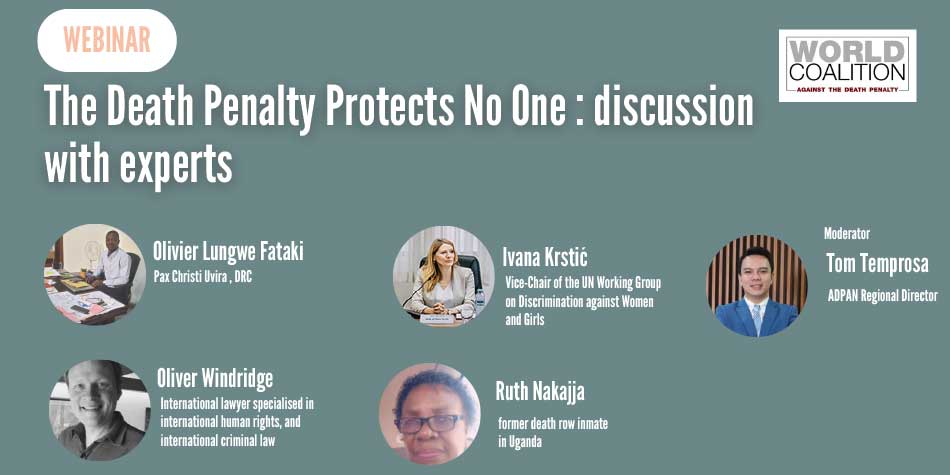Teng Biao: Olympics an opportunity to put pressure on the Chinese authorities”
Asia
On a visit to Paris last October, Teng Biao told us about his experience as an abolitionist in China. As the World Coalition is set to launch a campaign later this month against the death penalty in the host country of the Olympics, we publish this interview in agreement with Teng Biao despite his current difficulties: “I cannot give up my rights to express myself”, he said.
How did you become an anti-death penalty advocate?
In 2003, as I worked part time at a law firm, I got involved in the famous case of a person who died in a detention centre in Guandong. Organisations and individuals then asked me for legal aid and I gradually became a human rights lawyer.
I became an abolitionist just after I graduated in 2002. In China, most people oppose abolition. In fact, many want more death penalty. In the legal field, however, more and more scholars agree to abolish the death penalty step by step. But my opinion is that it should be abolished at once, without condition.
How did you form this opinion?
I read books about criminal theory and the death penalty, and got involved in capital cases where I found my clients to be innocent. There were cases where prisoners were executed and found innocent afterwards.
I found out that there are around 400 executions per year outside China, and about 8,000 in China. This is terrible.
How do you take action against the death penalty?
I write articles on websites and Chinese-language overseas journals, I accept interviews for the international media and I am a defence lawyer in death penalty cases.
It is not easy to be a defence lawyer in China. There is no independence of the judiciary. In serious cases, the judge is not free to pronounce the sentence and must obey orders from higher courts or Communist Party leaders.
In some cases, we find evidence that the accused is innocent. For example, four defendants were accused of a crime committed in Le Ping City, Jiang Xi province, in 2001. They had no connection with the crime and two of them were not even in the city. The prosecution had no evidence except oral testimony obtained under torture.
I wrote articles on websites, formed a lawyers’ group, sent a report to the Supreme Court and organised a symposium in Beijing in 2007 to discuss the case. There are similar cases in other provinces.
Most lawyers involved in these cases are human rights lawyers: they defend journalists, writers, etc. But many do not have an opinion on the death penalty. They have never been asked if it should be abolished.
Does what you say or write have an impact inside China?
Sometimes, the articles I wrote were published by official media or websites and were accessible to the Chinese people.
In China, you can discuss the death penalty in theory. Any opinion on the death penalty is permitted, but if you relate it to human rights conditions in the country, it gets sensitive.
I can say I am against the death penalty; I can say I want it abolished at once. But I cannot say there are more than 8,000 executions; I cannot say organs of executed prisoners have been removed or sold; I cannot say the Beijing Olympics should be boycotted because of the death penalty situation in China.
I can say things that other people cannot say because I am a bit famous, and because I am a teacher in a public university, i.e. I’m part of the socialist system. If I were fired from the university, it could be dangerous.
Did you have difficulties in the past?
In 2006, the police prevented me from attending an invitation to Geneva. They also blocked me from going to Yale as a guest lecturer twice, but the university invited me a third time and I was permitted to go. Also, I couldn’t attend a meeting in Hong Kong in 2007.
Pressure from the international community is very useful, and sometimes effective. Without international pressure, human rights activities in China would be more difficult.
What changes can we expect on the death penalty front in China in the near future?
I think that more intellectuals will agree with the abolition of the death penalty, and that we will be able to express our opinion through education, articles and books. Some scholars can have an impact on legislation, as they give advice before it is passed before the Congress.
The Olympic Games is an opportunity to put pressure on the Chinese authorities. The global moratorium resolution will have an impact on the opinion of the Chinese about the death penalty.
I also think the number of executions can decrease.
Since January 1, 2007, China’s Supreme Court must review every death sentence. Is this having an effect on execution numbers?
Some experts think they are decreasing but this is top secret and we cannot be sure. There is growing pressure on the Supreme Court to publish execution figures. The chief justice has openly expressed the idea that the death penalty should be taken seriously, and that every capital case should be without doubt.
Some scholars and officials think the death penalty should be abolished for non-violent crimes such as corruption, but interestingly this is opposed by ordinary people who see it as protection for powerful officials.
Do ordinary Chinese people often discuss the death penalty?
At the moment, most of them only have government-controlled information about the death penalty. But when they can discuss it freely, their opinion will change. More and more people have access to the Internet, which is more difficult to control. This will bring about change.
Also, the number of Christians in China is growing rapidly, both in official and underground churches. This too could be a good element against the death penalty.







